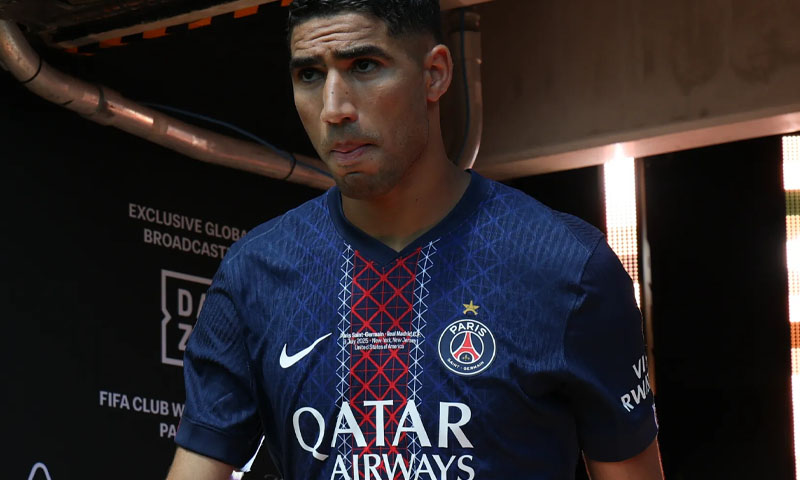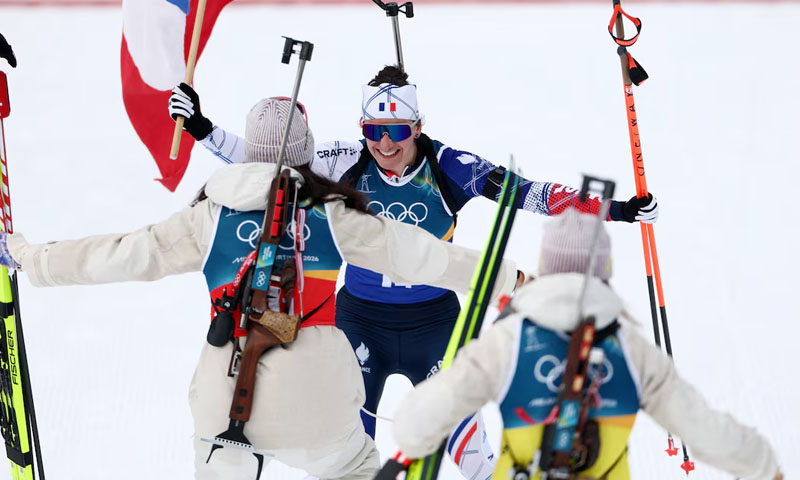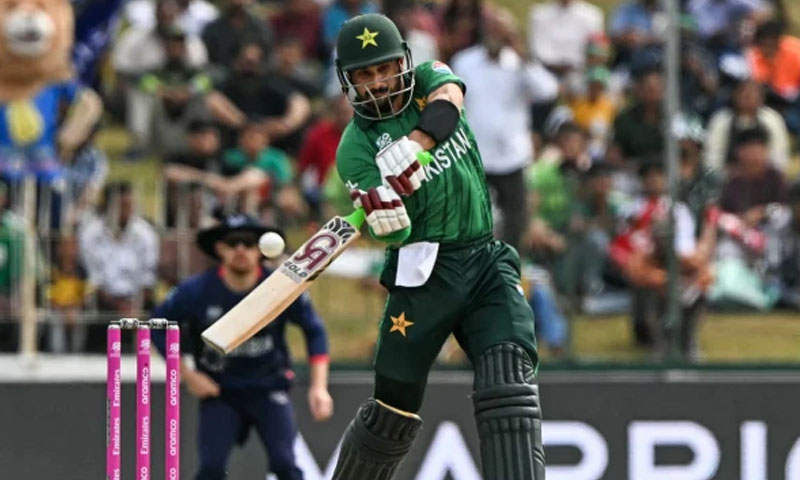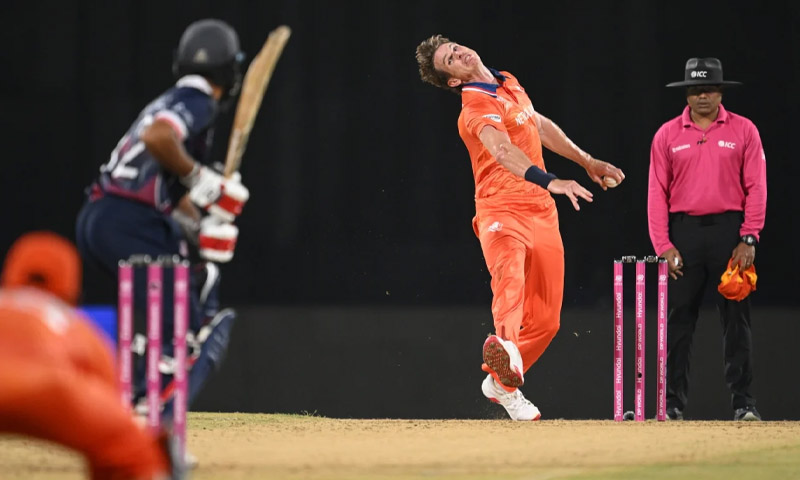- Web
- Feb 24, 2026
The rising tide lifts all boats: Daniyal Mirza and Pakistan’s growing sports ecosystem
-

- Ahmad Afzal
- Aug 20, 2025

Earlier this month, Daniyal Mirza could be seen and heard on Geo Super, making sense of the sweet science taking place at Azadi Fight Night. This past weekend he could be found in Riyadh, promoting homegrown talent on social media at the Esports World Cup.
And earlier in his life, in the early hours of Sunday mornings, Daniyal could be found glued to the TV in his basement. There, the hopes, dreams, and resolve of budding fighters, mainstay talents, and hardened champions were projected straight into the soul of a man who would soon become a pivotal piece of Pakistani sports. But, the blood, sweat, and tears spilling onto a canvas with the Ultimate Fighting Championship logo plastered across it, wasn’t what captured Daniyal’s interest at first. By that point, he was already firmly within sports entertainment’s grasp.
He was already in love with “the glitz, the glamour, all of that.” And he had “always been a fan.”
The Glitz and The Glamour
‘Always’ began when Daniyal was introduced to the world of professional wrestling by his Dad, which to him, is as far back as his first moments of consciousness. Even now, he still remembers Bret Hart’s pink and black attire accentuating the agony of whatever poor soul was locked in a sharpshooter. He still remembers one of his heroes, Jim Ross, shouting ‘My God!’ with southern base reverberating through the arena and out the TV, exciting any and all as a colorful character emerged out of the tunnel and below the jumbotron. But, most of all, Daniyal remembers the stories that laid the foundation to make every spear through a ladder that much more impactful.
“The main thing that always got me was the stories of these athletes, of these performers on screen and off screen. Because when you’re watching a fight, you’re seeing a story play out.”

Where did a fighter come from? What conditions did they overcome? What have they withstood? From a fighter’s upbringing to the trials and tribulations they overcame. From all the losses they stood up from, to all the victories where they were the last man standing. All of it comes together to grip the audience and pull them into a world where adrenaline is constantly coursing at a steady rate.
However, beyond the awe he instills in his audience, Daniyal believes he has an added responsibility. To wit, giving the fighters the respect they deserve. Something that wasn’t a given in Pakistan, due to the lack of dedicated broadcasters. While Daniyal credits the commentators and announcers of the past as pioneers, he finds it imperative to mention that although they did what they could, the task wasn’t treated as professionally as it is today. Ultimately, it was a disservice to those risking their health and wellbeing.
Babar Azam, Mohammad Rizwan demoted – PCB omits category A contracts
“This guys about to fight, this guy’s about to potentially put his life on the line, his career on the line, years of hard work on the line, because one fight can change everything for somebody.”
And that realisation bestowed Daniyal with an added layer of responsibility. The glitz and the glamour was the inciting incident, capturing his attention and love for the sport. But, if the sport was to grow, the athletes themselves would need to become known.
What’s Space Without The Stars?
Treating the stories of individual athletes with the “utmost care, the utmost responsibility, and the utmost effectiveness” became the key for Daniyal to convert first time watchers into long-term fans.
“When [athletes] become superstars is when the whole ecosystem expands. Without us having stars in these niche sports, there’s no growth.”

Daniyal points to cricket as one such example. Accompanying the strong infrastructure the sport is built on are the legends and icons that “surpassed the reality of being a normal human being.” Wasim Akram and Shoaib Akthar are a couple names Daniyal remembers as larger-than life. More recently, he finds Babar Azam carving out his own cultural personality. In essence, the goal is to ‘put these guys over’, a professional wrestling term meaning to make someone look good in the eyes of the audience. And to do that, there are three tenets of commentary that Daniyal follows.
The first is research. And its focal point is a fighter’s background. Where are they from? What styles and strategies do they like to employ? How have they fared against the competition recently? Branching off from here is the second tenet, something Daniyal learned listening to former UFC title challenger and current pundit, Chael Sonnen. What the Bad Guy from West Linn taught Daniyal was simple. In fact, it was exactly that, simplicity. Call what you see and don’t lie to the audience.
UFC 319: Chimaev wins middleweight title over du Plessis
“My job is to literally, as a play by play commentator, just say what I see.”
The third tenet serves to refine the second. With numerous techniques at a fighters’ disposal, each with a more complex denomination than the last, keeping up with the action can quickly become a confusing and tedious task. So Daniyal narrates the play by play as non-technical as possible for the average viewer’s sake.
“I shouldn’t be sitting there and just saying, oh, he’s got him in an imanari roll. If I’m being honest, no one knows what an Imanari role is.”
As sad as Tony Ferguson would be to hear that, a better approach for the viewer’s sake would be to explain the literal movements the fighter is doing – i.e. attempting to latch on to his opponents leg to force a takedown – and why the fighter is doing it – i.e. to force a submission via applying pressure to an opponents heel.
“I try to do my commentary in a way so that even if grandma watching at home is looking at these fights, she should be able to follow along.”
In Pakistan, the systematic step by step explanation becomes even more imperative, as the sport is still, relatively, in its infancy.
Read more: Titanium plates and tested patience: Kashmir’s Saria Khan returns to the cage
Growing Pains
That’s not to say that the sport hasn’t grown at all. Quite the opposite in fact. In recent years, Daniyal has seen quite a bit of change in the space. When he first entered the industry six years ago, the only MMA promotion was the Flogger series, run out of Rawalpindi by Nasir Khan. The difference between now and then? The degree of social media coverage.
“There was no coverage of what was going on. There’s no kind of place where people can go and just follow along with the news.”

While they have yet to reach the level of cricket players or TV personalities, some athletes in the space have tens of thousands of followers. The further promotion of these athletes, to further the sport as a whole, is an industry wide effort. And when he’s not announcing or commentating, Daniyal is doing just that on his digital platform, On the Mic, which features podcasts, interviews, and news on everything MMA and football in the country. Change in the combat sports industry may be happening slower than most would hope, but it’s happening nonetheless.
“Even if it’s very small compared to cricket, the fandom of mixed martial arts is developing in front of my eyes. I see young kids come up to me, and I’m not the star of the show. I never will be, and I never should be.”
Fighters are getting recognised and stopped for pictures at gyms and events more than ever. Even if there is a long way to go in Daniyal’s eyes, he sees it growing in the right direction. But as much as the sport has evolved, greater support from potential stakeholders is crucial. That’s not to say that the combat sports industry is expecting charity.
In fact, Daniyal made the disclaimer that growth begins by putting on fantastic events, marketing fighters, and increasing viewership, all in an effort to showcase the return on investment stakeholders can expect. The onus to bring in sponsors falls on the proponents of the industry. However, it’s here that a bit of a paradox lies.
“It’s still a chicken and egg situation. So is it us as a community that is not giving them enough of a return on investment? Or is it these companies and the government agencies not investing in the first place to get that return?”
To put on the type of events that Pakistan’s MMA scene needs to thrive, build popularity, and cite in order to bring in additional financing, there needs to be some initial investment. There is a degree of support to be found from provincial governments, such as with the Sindh government which funded the aforementioned boxing event that was hosted by Daniyal in Karachi. But, many private sponsors are still yet to see the appeal. Instead, they see a danger to their brands. For Daniyal, it’s a nearly two decade old mentality rooted in a mischaracterisation of the sport.
“They’re still stuck in 2010, a lot of them, where they’re like, this is a barbaric sport and there’s blood and there’s this.”
What Daniyal believes they fail to see is one of the fastest growing sports in the world. One based on honor, respect, dignity, and discipline. Values that Pakistani’s need, for both themselves as individuals and the nation as a whole, to succeed.

“You compare that to Eastern European countries, where there’s a massive boom of government investment and support towards combat sports. You see a change.”
Daniyal described that change as he reminisced about the streets of Uzbekistan, where he served as a ring announcer this past November for the International Mixed Martial Arts Federation World Championships. He saw a level of fitness and a level of general health that paints Pakistan in a less than favourable light when compared.
WWE: CM Punk’s triumph turned to tragedy; will WrestleMania avenge him?
So incentives for investment exist, both in the industry itself – seeing as it is one of the fastest growing sports in the world – and for the general population’s wellbeing. The onus may be on the combat sports industry to put on the best events possible, but equally, private entities must recognize the value in the field. One of the reasons they may struggle to do so are the constant forced comparisons drawn between cricket and every other sport in the country. Obviously, the former, with its much greater viewership, will fare better no matter what it’s compared against.
“If we constantly make the comparison to cricket, then the sport is just never going to grow. But people don’t understand that we need alternative sources of entertainment in Pakistan.”
However, the ‘cricket’ issue may run deeper than just unfavourable comparisons.
Monopoly and Mentality
Cricket’s dominance in the Pakistani zeitgeist has left little room for other sports to shine. It’s tried, tested, and tied to our nation’s identity. It’s safe, trustworthy, and the way in which it eclipses all else leaves people wondering if there’s even anything else to watch.
“When I say sports monopoly, I just mean it’s a very myopic and tunnel vision of like, this is the only thing which is working. So let’s just keep growing that.”

It’s a poor argument from Daniyal’s perspective. A sport won’t just explode onto the scene with the production value many demand. It takes a concerted effort from the fans to help build the sport. Because it all begins with viewership.
It’s a simple model. If MMA, or a relatively niche sport like it is to grow, it takes investment from the aforementioned stakeholders, so that different organisations can put on events that sports fans will be excited to see, with the media coverage that will allow them to see it. But in order to get that investment, sponsors need some guaranteed marketing mileage. If their brand’s name is printed and painted onto a canvas and cage that no one’s watching, what’s the point?
Instead, they can continue to invest in cricket, where banks, fast food chains, and telecommunication providers know they will get guaranteed eyes on their brands with every PSL match. However, Daniyal feels it’s pertinent to clarify who is at fault here. Because while it may seem like cricket is to blame, replace it with any other sport, and the real culprit comes to light.
“If MMA was in the position that cricket’s in, it would also be the same thing. It’s not the sport’s fault. It’s the people’s fault.”
Despite how much the national team loses, despite each and every poor performance, no one ever thinks to stop watching. No one ever thinks to hold the team accountable. They may groan and complain about the poor play. But they will still watch.
And so, investment will keep pouring in. Pakistan Cricket Board (PCB) Chief Financial Officer Javed Murtaza confirmed this past March that a budget of PKR 18 billion had been allocated for stadium upgrades prior to, and following, this year’s Champions Trophy. Daniyal believes a fraction of that could change the entire trajectory of some of the other, more niche, sports in the country. What makes such a realisation even more frustrating, is that while Pakistan flails and flounders on the cricket pitch, the country is dominating in other sports.
Read more: Samar Khan and the snowstorm at the summit
In Spite Of The Load-shedding
Esports provides an alternative perspective that highlights the failure of both the average consumer and private entities in supporting sports in Pakistan, for two reasons. Firstly, it’s globally recognised to a degree that other niche sports aren’t. The multi-billion dollar industry is expected to be viewed by over 600 million people this year. Secondly, unlike in Cricket, Pakistan is dominating certain fields within Esports. Look no further than Tekken.
“If cricket and these other sports can get that kind of recognition for being, quite honestly, a mid-tier performer within the international cricket sphere, then these esports athletes need to be recognised just as well.”

Daniyal explained that after six EVO championships, Pakistan’s own Arsalan Ash is widely considered to be at the top of the Tekken world. And he did it despite all the blockades. In spite of the loadshedding. In spite of the lack of infrastructure. In spite of a lack of government support in helping athletes attend some of the biggest tournaments, such as EVO Japan, where Pakistan’s presence has been severely lacking. These past two years, no Pakistanis have gotten a visa to go. Not even the greatest Tekken player of all time.
“And that is again, a failure on our government’s part to make sure that this kind of relationship doesn’t exist between two countries in such a big industry where your players can’t go and compete at the highest level.”
Pakistan moves to draft first esports policy to boost digital economy
It’s a regrettable state of affairs considering the numerous hurdles Esports athletes like Arsalan have had to overcome to compete. Not only is the talent present. Not only is Esports one of the fastest growing industries out there. Not only is the country decorated in the field. But, most importantly, it’s fun to watch.
“It’s so fast-paced, you know, it’s so continuous, so dynamic, that you forget that you’re watching two dudes play a video game. You’re now watching reactions, movements, split-second decisions.”
Still, some are hesitant to give Esports the legitimacy it so justly deserves. The distinction between video games and ‘real’ sports is still firmly held for many. But, that hasn’t stopped Daniyal and others within the industry from making waves. Baaz Esports is one such organisation. Led by Danyal Chishty, Baaz has put on a myriad of record breaking events, including Takedown 2023, the largest attended Esports event in Pakistan’s history, and Baaz Gauntlet 2024, the most watched Esports broadcast in the country’s history.
Earlier this year, Baaz took Pakistani Esports to even higher heights by partnering with SOOP to create Pakistan vs Korea, which became the most watched fighting game event of 2025 globally. Later this year, they’re putting on Takedown 2025, which for the first time will be part of Bandai Namco’s Tekken World Tour Circuit, marking Pakistan’s entry into international competitive gaming.
Pakistan rules the gaming world; Arslan Ash wins Battle Arena Melbourne 15
Daniyal has been in the midst of Baaz’s ascent, working with the organisation as content director, as well as a commentator. Like MMA, the three tenets apply here as well, with Daniyal doing his best to give both the game and the players the respect they deserve, while making the viewing experience fun regardless of the technicalities.
“And that’s number one, because in both sports, MMA and esports, the job is to create new fans. It’s our job to generate more interest. And you can only do that when they’re actually enjoying themselves, regardless of the technical details that they may not understand yet.”
Rising Tide Raises All Boats
Whether it’s guiding the audience as a commentator, getting that adrenaline coursing as an announcer, or his day to day work as a freelance sports management consultant, it’s clear that Daniyal is committed to bringing greater attention to niche sports in the country.
What led him to dedicating his time and effort to Pakistan was frustration with the current sports landscape, which is purely cricket focused. Even when presented with the opportunity to seek out his masters degree from Berlin on a scholarship, Daniyal chose to stay in the country. To study here and invest his own time into building a runway from which Pakistani sports could take off.
“Why? Because I feel like there’s a lot of work to be done and there’s not a lot of people doing that work, especially in smaller sports.”

It’s not simply altruism however. It’s a tittle of that aforementioned frustration, mixed with an undying passion for the sports he covers. Because for Daniyal, when it comes to the entertainment and excitement that sports like MMA bring, cricket can’t compare.
“It’s night and day. When you see two dudes fighting in a cage under the bright lights, there’s nothing like it.”
But what sets him apart from everyone else is a third element. One that sharpens his passion, turning it into motivation. It’s his hunger to be the best at what he does, not just in Pakistan, but the world.
“I want to work in the local scene for as long as I can, for as long as it allows me to. But my personal goal is to be the best ring announcer in the world. And I don’t say that lightly.”
It’s not hyperbole for Daniyal.
That much is clear when you look at his track record. In the last six years he’s done 129 events including 50 MMA shows, 23 concerts, 20 Esports events, 13 boxing events, four pro-wrestling events, three futsal events, two badminton events, two football events, and a racing event. But to become an established name in the industry, he had to sacrifice pay early on as well. Something he didn’t mind, as long as it meant he could help smaller promotions.
“Most of the time promoters, small promoters, can barely afford to pay fighters. So I don’t charge them, you know, smaller events, smaller promotions, organic efforts. What am I charging them for if fighters aren’t getting paid?”
Out of the aforementioned 129, 40 shows were unpaid. Daniyal’s willingness to help smaller organisations expand their operations, and in turn the industry as a whole, highlights one of his core beliefs. A belief that summarises his philosophy regarding the sports industry aptly.
“The rising tide lifts all boats.”
If Daniyal can put a spotlight on the often overshadowed sports in Pakistan, the sports ecosystem as a whole will grow. Pakistani MMA will grow. Pakistani Esports will grow. Pakistani football will grow. And with them, the homegrown voice of Pakistani sports will too.




